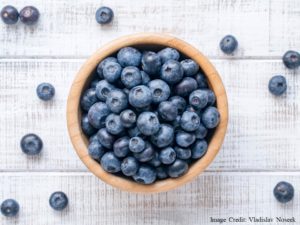This interdisciplinary field draws on expertise from many different branches of research.
Psychologists warn us about working memory overload, and suggest strategies for enhancing students’ motivation.
Neuroscientists describe the changes in neural networks that — as we understand things so far — convert new learning into long-term memory.
Somnologists (!) can tell us about the benefits of REM sleep, while exercise physiologists help us understand the relationship between health and learning. (I’m looking at you, brain-derived neurotrophic factor.)
And so forth.
 But, you might ask: what about nutrition? Can our students eat their way to more learning? Surely this field has wisdom and guidance to offer?
But, you might ask: what about nutrition? Can our students eat their way to more learning? Surely this field has wisdom and guidance to offer?
I hear different versions of this question frequently — often focusing on blueberries — so I was happy to see recent research exploring important questions about the relationship between diet and cognition.
Here’s the story.
Mazes, Treasures, and Meals
A research team in Australia invited 120 students to make their way through a maze in a VR world. In this VR simuation, a lake is surrounded by two rings of distinctive landmarks: a lighthouse, a windmill, the Statue of Liberty, and so forth.
Study participants had to find their way across a hexagonal grid of planks to the location of a treasure chest. If they didn’t find the chest after 4 minutes, they were transported to its location — and then given a fresh chance to find the treasure from another starting place.
Here’s the key: participants could use the distinctive landmarks to triangulate the chest’s position. That is, they could say: “if the lighthouse is at my 2 o’clock, and the windmill at my 6 o’clock, and Lady Liberty at my 10 o’clock…I’m in the right place!” Using those bearings, they could navigate back to the treasure chest fairly easily.
Now comes the nutrition part.
The researchers also asked students about their intake of saturated fats and refined carbs. For the most part, the study doesn’t list the kinds of food they ask about overall (although it does mention specific questions about adding sugar to food). But the gist is: how much of their diet comes from the bad stuff — like saturated fats and refined carbs?
So here’s the big question: what’s the relationship between unhealthy foods (fats, carbs) and spatial navigation? Are the relatively healthy eaters better at finding their way around this maze?
Answers, and Some Doubts
In a word: “yes.”
The participants who had low scores on the fat/carb inventory learned the maze somewhat better than those who had higher scores.
Said another way: if you know a participant’s fat/carb intake, you could roughly predict how well they would do on the maze.
Here’s the boldest formulation of this finding: “an unhealthy diet interferes with spatial learning.”
Of course, any such blunt sentence requires MANY caveats.
First: for obvious reasons, this study didn’t actually monitor participants’ food intake for a month. The nutrition data are entirely self-reported…and we usually take self-reported data with a dash of skepticism.
Second: this study has an ENORMOUS dropout rate. 120 people signed up for the study, and SIXTY FIVE dropped out. (Apparently the VR world created a lot of nausea.) A reasonable person might decide not to trust the study for this reason alone.
Of course, the fact that it’s published means that other reasonable people decided not to worry so much about the dropout rate. Apparently nausea is a common problem with VR research.
Third: I’m legally obligated to say: “correlation isn’t causation.” It is possible that people who are bad at spatial learning therefore prefer fats and carbs. Or that a third factor causes both deficits in spatial learning and a preference for unhealthy food. In this case, even a skeptic like me is willing to infer the potential for causality…
As is so often the case, this one study is helpfully interesting. It is not, on its own, entirely persuasive.
Another Perspective
This study suggests a small correlation (and the potential for a causal relationship) between a fatty/carby diet and spatial learning.
In other words: YES, diet and nutrition do matter for learning.
I’d like to propose an alternative framework which — in my experience — simplifies lots of complex questions. Here goes…
We have A LOT of research showing that the brain IS A PART OF the body.
The brain is, in fact, PHYSICALLY ATTACHED to the body.
For that reason, everything that’s good for the body is good for the brain. Because (say it with me), the brain is a part of the body.
Sleep is good for the body; it’s therefore good for the brain.
Exercise is good for the body; it’s therefore good for the brain.
Good nutrition is good for the body…you get the idea.
I don’t honestly think we need a special category of “brain-focused nutrition advice.” All the basic nutrition guidance we already have tells us practically everything we need to know about “brain nutrition.” *
For example: as I wrote above, people get VERY excited about the brain health benefits of blueberries. I myself haven’t been able to find any strong research on this topic. (Here’s one pilot study with 15 participants.)
TL;DR
A recent study from Australia suggests that a high carb, high fat diet might interfere with spatial learning.
While this study has some quirks and flaws, it highlights a simple principle:
“If it’s good for the body, it’s almost certainly good for the brain. If it’s bad for the body, it’s almost certainly bad for the brain. Plan your meals accordingly.”
* If you have gotten medical advice about nutrition — even brain nutrition — you should follow it. I’m a teacher and a blogger; not a doctor, and not a nutritionist.
Tran, D. M., Double, K. S., Johnston, I. N., Westbrook, R. F., & Harris, I. M. (2025). Consumption of a diet high in fat and sugar is associated with worse spatial navigation ability in a virtual environment. International Journal of Obesity, 1-9.




